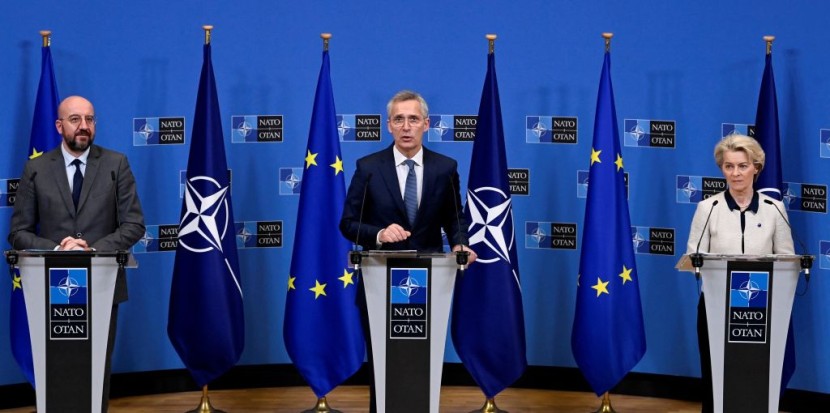
The European Union and NATO had agreed on a collaboration deal, but concerns about strategic autonomy took a back seat; as the US-backed military bloc avoided it.
EU-NATO Deal Lessens Bloc Autonomy
Official recognition by European Commission President Ursula von der Leyen, European Council President Charles Michel, and NATO Secretary-General Jens Stoltenberg; a 14-point agreement comes as the conflict in Ukraine has impacted the bloc since February, reported Euractiv.
NATO diplomat said that it should have been signed in 2022 during a Madrid summit, but the Ankara- Athens scuffle prevented it.
In Brussels, Jens Stoltenberg spoke to the media and said that western allies are not disunited and ready to move the deal to something like a no-limits partnership. He added that Putin hoped for less NATO but got the opposite result; there will be more and much more EU. The bloc is determined to contribute more successfully to global and transatlantic security, noted NY Times.
Both signed the agreement combining two prior joint declarations in 2016 and 2018. The latest iteration is the first of these declarations to bring up Russia and China by name; the remainder of the text remains unexceptional when identifying threats or pragmatic commitments. This pronouncement addresses the expanding geopolitics, safeguarding vital infrastructure, and handling threats from new technologies and space as critical places for thorough collaborative efforts.
Redefined Deal as Moscow, Beijing Lead
However, EU and NATO envoys mention that the memorandum itself is a strategic success, given the lengthy worries in some quarters that efforts to expand the EU's role in defensive strategy could nullify the US-led defense treaty.
Twenty-one of the EU's 27 member countries is a part of NATO, with Sweden and Finland on such a route to join the military alliance even by the finish of 2023.
A push for strategic autonomy by France and its attempts to expand the EU's defense role has, over time, raised tensions with Eastern European representatives who perceive America as Europe's leading security supplier.
The United States has long pushed its European allies to spend more money on defense, battle cyberterrorism, and enhance facilities across the region that are considered necessary to transition troops rapidly. Based on the new joint statement, NATO remains the core of mutual security for its participants and the bigger Euro-Atlantic region.
Moreover, the importance of a greater and much more competent European defense is comparable to and interoperable with global and transatlantic stability. Both have constructive and mutually reinforcing roles in advancing global peace and security, boosting the belief among members that the more powerful European army must support the US-led coalition instead of serving as a rival, as said by the Defense Post, citing Defense Post.
While the media asked if strategic autonomy was sacrificed for cooperation, Michel said the two organizations' main military doctrines would supplement each other.
Even so, it deprives the bloc of its freedom, producing a subordinate to a military alliance led by the United States. VDL defended the agreement by asserting that independence doesn't indicate that you don't work collaboratively; instead, you join forces with like-minded collaborators.
The European Union-NATO inked a collaboration deal that sidestepped the strategic autonomy that some bloc members preferred got dropped in the declaration.
Related Article : German Minister Says Worst-Case Energy Shortage Prevented From Critically Hobbling Germany
© 2025 HNGN, All rights reserved. Do not reproduce without permission.








